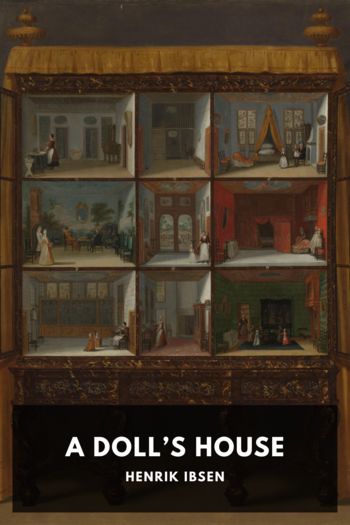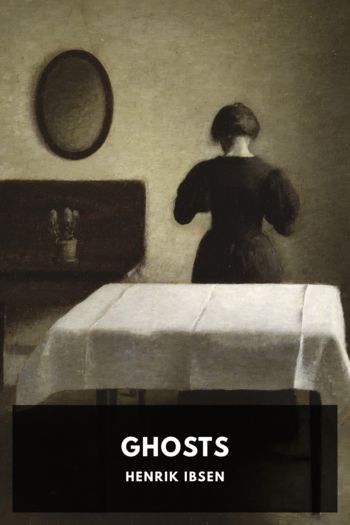Hedda Gabler by Henrik Ibsen (no david read aloud .TXT) 📕

Description
Hedda, the proud and willful daughter of General Gabler, newly married to George Tesman, returns from her honeymoon to Norway. She chafes at the prospect of a dull life in a loveless marriage until a former lover, Eilert Løvborg, returns and throws their financial future into disarray. The appearance of Hedda’s old schoolmate Thea, who wants to reform Løvborg, and Judge Brack, who wants Hedda in his power, leave her struggling to build the life she wants.
Hedda Gabler was first performed in Munich in 1891, and within months there were productions in Berlin, Copenhagen, London, and New York. It was Ibsen’s first play to be translated from proofs before performance or publication. Productions of the play have won two Olivier Awards and been broadcast in multiple countries; since 1917, it has been adapted into more than a dozen feature films in almost as many languages.
Read free book «Hedda Gabler by Henrik Ibsen (no david read aloud .TXT) 📕» - read online or download for free at americanlibrarybooks.com
- Author: Henrik Ibsen
Read book online «Hedda Gabler by Henrik Ibsen (no david read aloud .TXT) 📕». Author - Henrik Ibsen
“Thus,” says Dr. Brandes, “out of small and scattered traits of reality Ibsen fashioned his close-knit and profoundly thought-out works of art.”
For the character of Eilert Lovborg, again, Ibsen seem unquestionably to have borrowed several traits from a definite original. A young Danish man of letters, whom Dr. Brandes calls Holm, was an enthusiastic admirer of Ibsen, and came to be on very friendly terms with him. One day Ibsen was astonished to receive, in Munich, a parcel addressed from Berlin by this young man, containing, without a word of explanation, a packet of his (Ibsen’s) letters, and a photograph which he had presented to Holm. Ibsen brooded and brooded over the incident, and at last came to the conclusion that the young man had intended to return her letters and photograph to a young lady to whom he was known to be attached, and had in a fit of aberration mixed up the two objects of his worship. Some time after, Holm appeared at Ibsen’s rooms. He talked quite rationally, but professed to have no knowledge whatever of the letter-incident, though he admitted the truth of Ibsen’s conjecture that the “belle dame sans merci” had demanded the return of her letters and portrait. Ibsen was determined to get at the root of the mystery; and a little inquiry into his young friend’s habits revealed the fact that he broke his fast on a bottle of port wine, consumed a bottle of Rhine wine at lunch, of Burgundy at dinner, and finished off the evening with one or two more bottles of port. Then he heard, too, how, in the course of a night’s carouse, Holm had lost the manuscript of a book; and in these traits he saw the outline of the figure of Eilert Lovborg.
Some time elapsed, and again Ibsen received a postal packet from Holm. This one contained his will, in which Ibsen figured as his residuary legatee. But many other legatees were mentioned in the instrument—all of them ladies, such as Fraulein Alma Rothbart, of Bremen, and Fraulein Elise Kraushaar, of Berlin. The bequests to these meritorious spinsters were so generous that their sum considerably exceeded the amount of the testator’s property. Ibsen gently but firmly declined the proffered inheritance; but Holm’s will no doubt suggested to him the figure of that red-haired “Mademoiselle Diana,” who is heard of but not seen in Hedda Gabler, and enabled him to add some further traits to the portraiture of Lovborg. When the play appeared, Holm recognised himself with glee in the character of the bibulous man of letters, and thereafter adopted “Eilert Lovborg” as his pseudonym. I do not, therefore, see why Dr. Brandes should suppress his real name; but I willingly imitate him in erring on the side of discretion. The poor fellow died several years ago.
Some critics have been greatly troubled as to the precise meaning of Hedda’s fantastic vision of Lovborg “with vine-leaves in his hair.” Surely this is a very obvious image or symbol of the beautiful, the ideal, aspect of bacchic elation and revelry. Antique art, or I am much mistaken, shows us many figures of Dionysus himself and his followers with vine-leaves entwined their hair. To Ibsen’s mind, at any rate, the image had long been familiar. In Peer Gynt (Act iv. sc. 8), when Peer, having carried off Anitra, finds himself in a particularly festive mood, he cries: “Were there vine-leaves around, I would garland my brow.” Again, in Emperor and Galilean (Pt. ii. Act 1) where Julian, in the procession of Dionysus, impersonates the god himself, it is directed that he shall wear a wreath of vine-leaves. Professor Dietrichson relates that among the young artists whose society Ibsen frequented during his first years in Rome, it was customary, at their little festivals, for the revellers to deck themselves in this fashion. But the image is so obvious that there is no need to trace it to any personal experience. The attempt to place Hedda’s vine-leaves among Ibsen’s obscurities is an example of the firm resolution not to understand which animated the criticism of the ‘nineties.
Dr. Brandes has dealt very severely with the character of Eilert Lovborg, alleging that we cannot believe in the genius attributed to him. But where is he described as a genius? The poet represents him as a very able student of sociology; but that is quite a different thing from attributing to him such genius as must necessarily shine forth in every word he utters. Dr. Brandes, indeed, declines to believe even in his ability as a sociologist, on the ground that it is idle to write about the social development of the future. “To our prosaic minds,” he says, “it may seem as if the most sensible utterance on the subject is that of the fool of the play: ‘The future! Good heavens, we know nothing of the future.’ ” The best retort to this criticism is that which Eilert himself makes: “There’s a thing or two to be said about it all the same.” The intelligent forecasting of the future (as Mr. H. G. Wells has shown) is not only clearly distinguishable from fantastic Utopianism, but is indispensable to any large statesmanship or enlightened social activity. With very real and very great respect for Dr. Brandes, I cannot think that he has been fortunate in his treatment of Lovborg’s character. It has been represented as an absurdity that he would think of reading abstracts





Comments (0)